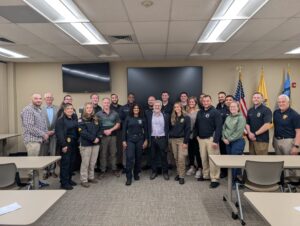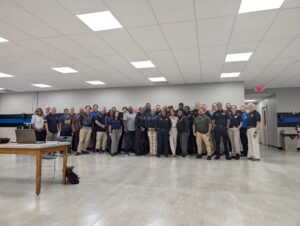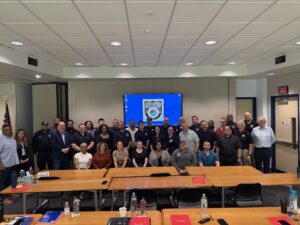Media Contact
Kiana Miranda
Communications & Public Relations Manager
Eagleton Institute of Politics
Kiana.miranda@eagleton.rutgers.edu
(848) 932-8092
For Immediate Release: 10/1/2025
PRESS RELEASE
Miller Center Offers Peer Support Training to Law Enforcement
NEW BRUNSWICK, N.J. (October 1, 2025) – The Miller Center on Policing and Community Resilience recently offered seven courses of a 40-Hour Peer Support Certification Program to approximately 200 New Jersey law enforcement officers. The first certified program of its kind in the nation, this training responds to a critical need in public safety. 
While some behavioral health resources already exist in the state of New Jersey, few law enforcement officers use them, and there is a notable lack of programming designed for local municipal law enforcement that is tailored to the needs of individual departments. Working together with partners, the Miller Center is building a peer-to-peer officer support program designed for the needs of local police departments.
New Jersey has taken the safety and wellness of its officers very seriously, and the support from the New Jersey State Office of the Attorney General, Chiefs of Police Association, police unions, and the County Prosecutors has been and continues to be a stabilizing and continuing commitment to this endeavor.
The Miller Center and its team have a long history in the officer wellness space. In 2018, Jim Nestor, a Miller Center Senior Policy Advisor and internationally recognized employee assistance professional, developed a 40-hour Peer Support training program to enhance the abilities of first responder peer advocacy. Having spent 40 years in behavioral health for law enforcement officer’s assistance, Nestor is a believer in policy and standards of practice. He utilized his experience, as well as the IACP Peer Support Guidelines, the President’s Task Force on 21st Century Policing, the Miller Center, and the support of many subject matter experts to develop this program. These early subject matter experts included Cherie Castellano, a global leader in officer mental health for peer development, and the New Jersey State Police Employee Assistance and Peer Units.
 Nestor, along with the assistance of the Miller Center’s Colonel Joseph Fuentes, Ph.D. (Ret.) Superintendent NJSP and Rosalyn Bocker Parks, Ph.D., provided research and development oversight with four peer training pilot projects undertaken with the Amtrak Police Department, Philadelphia Fire Department, Ocean City, NJ Public Safety responders, and the NJSP Peer Unit.
Nestor, along with the assistance of the Miller Center’s Colonel Joseph Fuentes, Ph.D. (Ret.) Superintendent NJSP and Rosalyn Bocker Parks, Ph.D., provided research and development oversight with four peer training pilot projects undertaken with the Amtrak Police Department, Philadelphia Fire Department, Ocean City, NJ Public Safety responders, and the NJSP Peer Unit.
In August 2019, the New Jersey Attorney General issued the “Officer Resiliency Directive,” a first-in-the-nation statewide program to support the emotional and psychological well-being of law enforcement officers. The directive required that the state and each county and local law enforcement agency designate a Resiliency Program Officer (RPO), who will be specially trained in helping officers handle the daily stress of police work. RPOs were tasked with providing a two-day Resiliency Training program for all New Jersey sworn officers and in the next three years did so for over 37,000 officers. Additionally, RPOs were chosen and received additional training to include some 1,700 law enforcement personnel.
 During this period the New Jersey Police Training Commission (PTC), Division of Criminal Justice (DCJ), Office of the Attorney General, and members of the International Association of Directors of Law Enforcement Administrators (IADLEA) requested a pilot project with outcome data to begin a certification process for the 40-Hour Peer Support Training.
During this period the New Jersey Police Training Commission (PTC), Division of Criminal Justice (DCJ), Office of the Attorney General, and members of the International Association of Directors of Law Enforcement Administrators (IADLEA) requested a pilot project with outcome data to begin a certification process for the 40-Hour Peer Support Training.
In June 2024, this was accomplished with the assistance of prior mentioned SMEs, and the former State Chief Resiliency Director, NJSP Ret. Captain Dave Leonardis, as well as, two Master Resiliency Officers, LT Joe Waters and SGT Janet Thai, both DCJ Investigators.
In January 2025, the New Jersey PTC approved the 40-Hour Peer Support training as a Certification Course to be provided to the State’s 1,700 RPOs. With the Miller Center administering the training with its SMEs, and funding provided by New Jersey’s Urban Areas Security Initiative (UASI), the Peer Certification project began training RPOs for the Northern New Jersey Regional UASI counties. With the leadership and foresight of James Sheehan, Ret. Dep. Chief Paramus PD and current UASI Program Manager, this national model grew with passion.
Other supporting Subject Matter Experts that have had invaluable impact on the training include Dr. Kate Felice, Former LT Gloucester County Prosecutor’s Office and Professor, Rowen University; NJSP Ret. LT Mike Parmenter, presently EAP Coordinator; Dr. Mike Wiltsey, Ret. LT Burlington County Prosecutors Office; Dr. Mark McLaughlin, Princeton Brain and Spine Care; and Det. Brad Waudby Bergen County Prosecutors Office.
Evaluation of the program and data research development will be used to continually enhance this most important special certification. Additionally, a re-certification process is being developed with Standards of Practice to include on-going annual education for recertifying RPOs. Six counties and one urban agency, Newark Police Department, were trained during the first six months of this year. Data research from these courses will be developed and reported, while continued funding will provide training for the remaining UASI Region RPOs.
It is the intention of the Miller Cetner to ultimately train all 1,700 Certified Peer RPOs, inclusive of corrections officers as well.
###
About Rutgers University’s Miller Center on Policing and Community Resilience
The Miller Center on Policing and Community Resilience advances research, education and outreach focused on building stronger relationships between communities and public safety institutions. As part of Rutgers University’s dedication to service, innovation and justice, the Center leads initiatives that promote accountability, trust and strategic resilience in policing and community safety.
About the Eagleton Institute of Politics
The Rutgers Miller Center on Policing and Community Resilience is a unit of the Eagleton Institute of Politics at Rutgers University-New Brunswick. The Eagleton Institute studies how American politics and government work and change, analyzes how the democracy might improve and promotes political participation and civic engagement. The Institute explores state and national politics through research, education and public service, linking the study of politics with its day-to-day practice.
About Rutgers University-New Brunswick
Rutgers University-New Brunswick is where Rutgers, The State University of New Jersey, began more than 250 years ago. Ranked among the world’s top 60 universities, Rutgers’s flagship university is a leading public research institution and a member of the prestigious Association of American Universities. It is home to internationally acclaimed faculty and has 12 degree-granting schools and a Division I Athletics program. It is the Big Ten Conference’s most diverse university. Through its community of teachers, scholars, artists, scientists and healers, Rutgers is equipped as never before to transform lives

